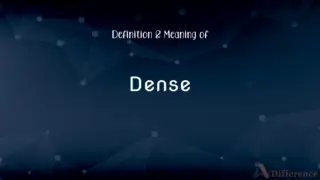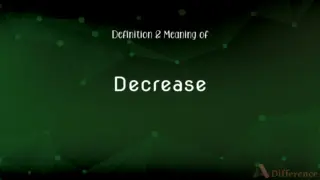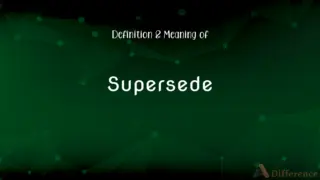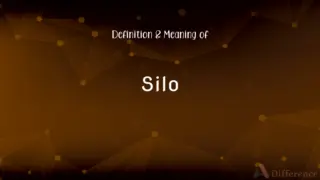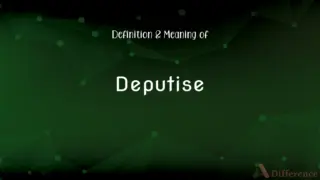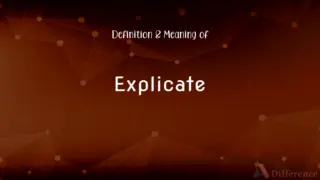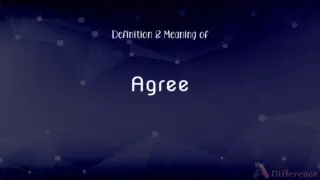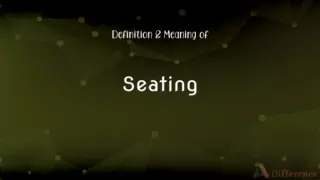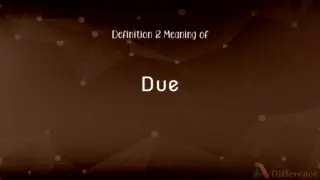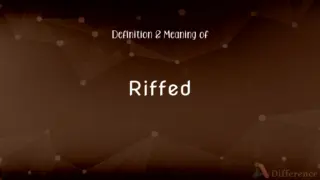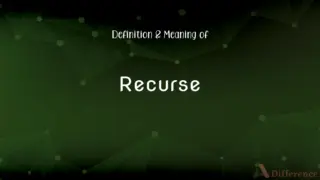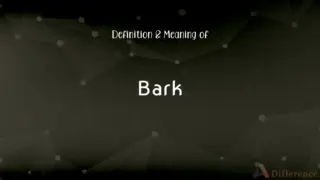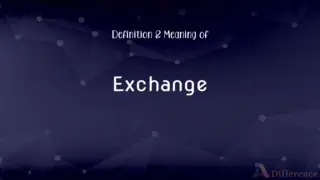Recognise Definition and Meaning
By Tayyaba Rehman & Urooj Arif — Updated on March 5, 2024
Recognise means to identify someone or something from having encountered them before; to acknowledge the existence, validity, or legality of something. e.g., She didn't recognise him with his new haircut.
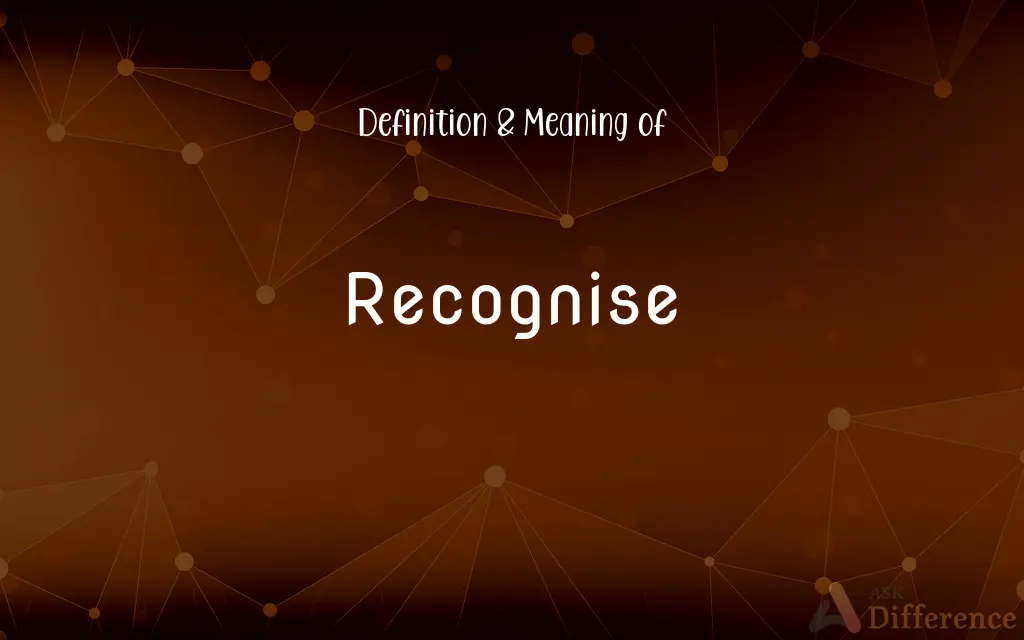
Table of Contents
Recognise Definitions
Acknowledgment: To acknowledge the importance or quality of something.
The organization refused to recognise the newly elected official.
He could recognise his friend's voice in the crowd.
Certification: To certify or endorse someone or something officially.
Identification: To identify a person or thing as already known.
The program is recognised by the state education board.
The awards ceremony was held to recognise excellence in teaching.
Acknowledging Authority: To acknowledge someone's authority or status.
She began to recognise the truth about her situation.
Distinguishing: To distinguish between things; to tell apart.
Appreciation: To show gratitude or appreciation for something.
Young children can recognise basic shapes.
It's important to recognise the efforts of volunteers.
Understanding: To show understanding or comprehension of something.
Realization: To become aware of something.
Can you recognise the difference between these two species?
Acceptance: To accept the validity or legality of something.
The community gathered to recognise the achievements of its athletes.
Standard spelling of recognize
Show approval or appreciation of;
My work is not recognized by anybody!
The best student was recognized by the Dean
Grant credentials to;
The Regents officially recognized the new educational institution
Recognize an academic degree
Detect with the senses;
The fleeing convicts were picked out of the darkness by the watchful prison guards
I can't make out the faces in this photograph
Express greetings upon meeting someone
Express obligation, thanks, or gratitude for;
We must acknowledge the kindness she showed towards us
Be fully aware or cognizant of
Perceive to be the same
Accept (someone) to be what is claimed or accept his power and authority;
The Crown Prince was acknowledged as the true heir to the throne
We do not recognize your gods
The country was one of the first to recognise the new government.
Celebration: To celebrate or honor someone or something for their achievements.
Recognise Snonyms
Identify
Establish or indicate who or what (someone or something) is.
The witness was able to identify the suspect in a lineup.
Notice
Become aware of.
Did you notice the error on page ten?
Admit
Confess to be true or to be the case.
He admitted that he had made a mistake.
Discern
Perceive or recognize (something).
She could discern the faint sound of music in the distance.
Acknowledge
Accept or admit the existence or truth of something.
She acknowledged his expertise in the subject.
Appreciate
Recognize the full worth of.
She failed to appreciate the gravity of the situation.
Realize
Become fully aware of (something) as a fact; understand clearly.
He realized the importance of the meeting only afterwards.
Detect
Discover or identify the presence or existence of.
The test is used to detect the presence of alcohol in the bloodstream.
Understand
Perceive the intended meaning of.
I understand your concerns regarding the project.
Accept
Consent to receive or undertake something offered.
He accepted the award on behalf of the team.
Recognise Idioms & Phrases
Recognise the need
To acknowledge the necessity for something.
The city council recognised the need for more public parks in the growing neighborhood.
Recognise the effort
To acknowledge and appreciate the work or attempt someone has made.
The company made sure to recognise the effort of its employees with annual awards.
Recognise the truth
To accept or acknowledge the reality of a situation.
It took him a long time to recognise the truth about his failed business venture.
Recognise one's own
To identify and acknowledge people who share similar characteristics or backgrounds.
Even in a foreign country, they could recognise their own by the language they spoke.
Recognise a problem
To acknowledge that an issue exists and needs to be addressed.
The first step in solving any issue is to recognise a problem exists.
Recognise a face
To remember and identify someone by their appearance.
She could recognise a face in the crowd that she hadn't seen in years.
Recognise the danger
To be aware of and acknowledge a threat or risk.
The hikers failed to recognise the danger of the approaching storm.
Recognise one's talents
To acknowledge and appreciate someone's skills or abilities.
The art school recognised her talents and offered her a scholarship.
Fail to recognise
To not acknowledge or realize the importance, presence, or value of someone or something.
He failed to recognise the warning signs of the impending crisis.
Recognise authority
To acknowledge and respect someone's position or power.
The new recruits were quickly taught to recognise authority within the military hierarchy.
Recognise one's limits
To acknowledge and accept one's capabilities and restrictions.
As an athlete, it's important to recognise one's limits to avoid injury.
Recognise a voice
To identify someone by the sound of their speech.
Even without seeing him, she could recognise his voice in the dark room.
Recognise one's own mistakes
To acknowledge and accept responsibility for one's errors.
Part of growing up is learning to recognise one's own mistakes.
Recognise the significance
To understand and acknowledge the importance of an event, action, or person.
Historians recognise the significance of the event in shaping the country's future.
Recognise an opportunity
To see and acknowledge a chance for advancement or success.
The entrepreneur was quick to recognise an opportunity in the emerging market.
Recognise a pattern
To identify and acknowledge a recurring theme or trend.
The detective recognised a pattern in the series of events that led to solving the case.
Recognise a contribution
To acknowledge and give credit for someone's part in a project or success.
The community project made sure to recognise a contribution from all volunteers.
Recognise the difference
To identify and acknowledge the distinction between two or more things.
It's vital to recognise the difference between constructive criticism and negativity.
Recognise the importance
To understand and acknowledge the value or critical nature of something.
The company began to recognise the importance of work-life balance for its employees.
Recognise a debt
To acknowledge a financial or moral obligation.
The nation recognised a debt of gratitude to its veterans for their service.
Recognise Example Sentences
It's hard to recognise the city with all the new buildings.
Teachers should recognise students' achievements in the classroom.
I recognise that song; it's my favorite!
We must recognise the importance of preserving the environment.
It's vital to recognise your own biases in decision-making.
Schools often hold ceremonies to recognise academic excellence.
The museum exhibition aims to recognise local artists.
It took a while for her to recognise the symptoms of the illness.
The software can recognise your face and unlock the phone.
The international community was slow to recognise the crisis.
The law does not recognise verbal agreements as legally binding.
I didn't recognise the number, so I didn't answer the call.
He received a medal to recognise his service in the military.
They were the first company to recognise the potential of the internet.
She did not recognise the significance of the moment until much later.
Common Curiosities
How many syllables are in recognise?
There are three syllables in recognise.
How do we divide recognise into syllables?
Recognise is divided into syllables as rec-og-nise.
What is a stressed syllable in recognise?
The first syllable, "rec," is the stressed syllable in recognise.
How is recognise used in a sentence?
"She failed to recognise her friend in the crowd."
Why is it called recognise?
It is called recognise because it refers to the act of identifying someone or something seen previously or acknowledging the existence, validity, or legality of something. The term comes from the Latin "recognoscere," meaning "to know again, recall to mind."
What is the verb form of recognise?
The verb form is "recognise."
What is the pronunciation of recognise?
The pronunciation of recognise is /ˈrɛk.əɡ.naɪz/.
What is the third form of recognise?
The third form (past participle) is "recognised."
What part of speech is recognise?
Recognise is a verb.
What is the singular form of recognise?
As a verb, recognise does not have a singular or plural form in the way nouns do; it remains "recognise."
What is the root word of recognise?
The root word of recognise comes from the Latin "recognoscere."
Is recognise a noun or adjective?
Recognise is a verb.
What is the first form of recognise?
The first form (base form) is "recognise."
Is the word recognise is imperative?
Yes, recognise can be used in the imperative form as a command, e.g., "Recognise the efforts of your team."
Is the word recognise Gerund?
The gerund form of recognise is "recognising."
Is recognise a negative or positive word?
Recognise is neutral; its connotation depends on the context in which it is used.
Which determiner is used with recognise?
Determiners are not typically used directly with verbs.
What is another term for recognise?
Another term for recognise is "acknowledge."
Is recognise a collective noun?
No, recognise is not a collective noun.
Which vowel is used before recognise?
Articles "a" or "an" are not typically used directly before verbs like "recognise."
Which preposition is used with recognise?
Common prepositions used with "recognise" include "as" (recognise as) and "by" (recognised by).
What is the plural form of recognise?
Not applicable, as recognise is a verb and does not change form between singular and plural subjects.
What is the second form of recognise?
The second form (simple past) is "recognised."
What is the opposite of recognise?
The opposite of recognise could be "ignore" or "overlook."
Is recognise an adverb?
No, recognise is not an adverb.
Is recognise an abstract noun?
No, recognise is a verb, though the concept it represents can be considered abstract.
Is recognise a vowel or consonant?
This question does not apply to the word "recognise" as a whole; it pertains to individual letters.
Is recognise a countable noun?
Recognise is not a noun; it's a verb.
Is the recognise term a metaphor?
Recognise can be used metaphorically in contexts where acknowledging or understanding is not literal.
Is the word “recognise” a Direct object or an Indirect object?
"Recognise" is a verb and thus does not serve as a direct or indirect object. However, it can take a direct object, e.g., "He recognised the painting."
Which conjunction is used with recognise?
Conjunctions like "and," "or," and "but" can be used in sentences involving "recognise."
Which article is used with recognise?
Articles are not used directly with verbs like "recognise."
Share Your Discovery
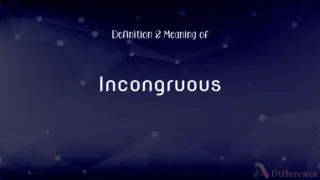
Previous Term
Incongruous Definition and Meaning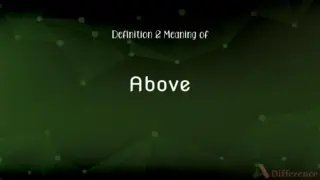
Next Term
Above Definition and MeaningAuthor Spotlight
Written by
Tayyaba RehmanTayyaba Rehman is a distinguished writer, currently serving as a primary contributor to askdifference.com. As a researcher in semantics and etymology, Tayyaba's passion for the complexity of languages and their distinctions has found a perfect home on the platform. Tayyaba delves into the intricacies of language, distinguishing between commonly confused words and phrases, thereby providing clarity for readers worldwide.
Co-written by
Urooj ArifUrooj is a skilled content writer at Ask Difference, known for her exceptional ability to simplify complex topics into engaging and informative content. With a passion for research and a flair for clear, concise writing, she consistently delivers articles that resonate with our diverse audience.







